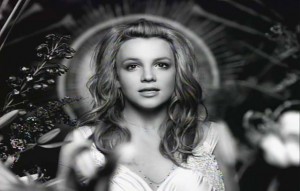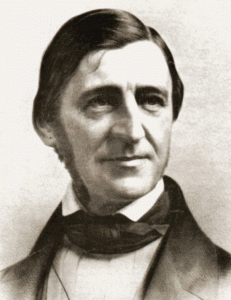Britney Spears: American Transcendentalist
Take a stroll around the internet and read the major reviews of Britney Spears’s new album, Britney Jean: Rolling Stone, Spin, Billboard, etc. Opinions are mixed, but few music writers (with one exception) are answering the question that’s keeping everyone up at night: what does Britney Spears’s new album mean for contemporary religious practice?
On the press junket to promote Britney Jean, Britney constantly repeated that this was her “most personal album.” While her album contains none of the hotly anticipated details of her private life, Britney Jean does go beyond the usual dance club themes of lust, rhythm, and kiss-offs. The first half of the album is full of your standard club smashers. But the second half veers into less familiar Britney territory when she sings the praises of a useful life (“Now That I Found You”), the right man (“Hold on Tight”), and family comforts (“Chillin’ With You”). Throughout all these slow to mid-tempo numbers runs the common image of a light in the darkness, offering guidance and hope. Britney Jean is two albums in one: a dirty grind and a gospel sing-a-long.
In particular, Britney has three songs that could just as easily be sung in a religious service. In case your childhood was not spent in the bowels of a megachurch, here’s a handy checklist for recognizing a worship song.
1) Does your song have a four-chord progression, easy for your volunteer band of weekend musicians to memorize and play?
2) Is it in a mid-range key, suitable for a wide range of people with no vocal training?
3) Are there handclaps? A round?
4) Are the dull but uplifting lyrics broadly evocative of inspiring things such as: a sunset, purple mountains’ majesty, stars, soaring birds, or a candle in the wind?
In “Now That I Found You,” Britney joyfully belts out a litany of elements plucked straight out of a Protestant hymnal: light, love, flying, truth, and faith. “Passenger,” a Katy Perry-penned track, is strikingly similar to Carrie Underwood’s “Jesus Take the Wheel.” But the stakes are highest in “Brightest Morning Star,” a song titled after a Biblical phrase. Britney said as much, tweeting that “’Brightest Morning Star’ is a song @Sia helped me write about God.” Sia, an Australian pop star who penned three songs on Britney Jean, told Rolling Stone that Britney “wanted to write a kind of gospel song that wasn’t ramming it down your throat.” In fact, you could read any one of these songs as a love ballad directed at a human person (you know, other than Buff Jesus). Britney is trying to fly her religion flag under the radar.
You may remember Britney’s various religious phases from years past. In 2006, under Madonna’s patronage, she started studying Kabbalah. She even tattooed one of the 72 names of God on the back of her neck. But it couldn’t last forever, and some months later she wrote a post on her website explaining: “I no longer study Kaballah. My baby is my religion.” She then took that baby, her first son, to receive a blessing at the Malibu Hindu Temple. By dabbling in religious traditions and finding sacred motherhood, Britney established herself as Spiritual But Not Religious (SBNR), just a seeker on a journey.
Now, however, she’s returned to her Baptist roots and is once again a self-identifying Christian. In November, Britney tweeted that her favorite author is Max Lucado, a famous evangelical pastor who has penned more than 80 books. Lucado is also stridently opposed to gay marriage. That stance was bound to ruffle the feathers of Britney’s substantial gay fanbase, and indeed there was a minor backlash. By and large, however, her fans seem willing to dismiss the comment as harmless. It’s not.
The problem with being SBNR is that you declare yourself to be above the politics of the religious community. Your spirituality is of a higher order than the petty bureaucratic struggles of organized religion. But at the same time, you receive the benefits of belonging to that community. Britney attends church (at Calvary Community Church in Thousand Oaks, where they have a contemporary service in which Britney’s new songs could find a great home). She reads the literature. She is legit Christian.
Spirituality and religion are complicated issues. It is quite possible, and in fact probable, that Britney Spears has a problematic, constantly re-negotiated relationship with institutional Christianity. It is not fair to mark her with the opinions of every Christian writer, even one she has endorsed. It is, however, fair to point out that she is promulgating Christian sentiments without coming out and saying that. This kind of secret spirituality is concomitant in American culture. We should recognize it for what it is, because it underlies all of our political and cultural infrastructure.
The Protestant tradition is endemically American, and because of that it’s invisible. We rarely notice or care about this kind of spiritual language because it is so utterly familiar. Britney’s lyrics are the kind of language we hear everyday in America: part mystical nature worship, part independent spiritual search, part request for guidance. These three songs are the modern version of American Transcendentalism, the variety of religious experience most tightly woven into the fabric of American society.
Ready for some transcendentalism truth talk?
Transcendentalism started in Massachusetts in the 1820’s as a response to a perceived intellectual bias in the Unitarian church. Led by notable scholars like Ralph Waldo Emerson and Margaret Fuller, Transcendentalists believed that religious practice should be an individual endeavor. Emerson’s essay “Nature” and Henry David Thoreau’s Walden championed communion with the natural world as the surest way of experiencing the immanence of God. These works use language similar to Britney’s lyrics, describing spontaneous individual religious experience through the sun, stars, and woods. In America’s wide sectarian upheaval during the early to mid-19th century, these ideas appealed to a variety of people. Transcendentalism fit well with the peculiar separation of church and state dreamt up by the Founding Fathers. It offered little allegiance to a hierarchical church system, calming the overwhelming fear of the Papacy that consumed American minds. This religion would instead be built on the open spaces of American soil (and its lumber, waterways, and mineral deposits) as a religious expression of Manifest Destiny. Early Americans may not have had an ancient ceremonial tradition like Europeans did, but they certainly had a lot of nature at their disposal. Transcendentalism played to our strengths.
After a brief second wave in the 1840’s, Transcendentalism as a movement mostly died out. It was too difficult to keep a community organized around a loose group of solitary practitioners. But it’s still in the back of our collective national consciousness, sneaking out in unexpected places like pop songs. Which is all well and good, but we should always consider that, endemic as Christianity is to our culture, it’s not always a benign old thought system. Britney Spears, in not wanting to ram God talk down our throats, is also giving herself a free pass when it comes to the parts of organized religion that she doesn’t want to publicly address. She is part of a community and a power structure that impacts popular attitudes and state policy. That’s why her tweet about Max Lucado, and Lucado’s homophobia, should not be so easily set aside. We are all responsible for our roles in the institutions we support. Even those of us who are 3-time AOL Award winners.








Dilettante Mail
Get updates from us a few times a year.